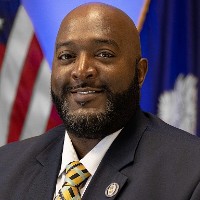INSIDE ISSUE 19.22 | May 29, 2020
 BIG STORY: Legislators want fixes for ailing juvenile justice agency
BIG STORY: Legislators want fixes for ailing juvenile justice agency
NEWS BRIEFS: Poll suggests teacher resignations could come in fall
COMMENTARY, Brack: An open letter to racists
SPOTLIGHT: Municipal Association of South Carolina
FEEDBACK: Send us your thoughts
MYSTERY PHOTO: The cross might be a hint
S.C. ENCYCLOPEDIA: Granby
Legislators want fixes for ailing juvenile justice agency

By Lindsay Street, Statehouse correspondent | A Feb. 5 federal report sought to make South Carolina’s child offender complex safer. But its director said it had the opposite effect as guards became wary to isolate unruly juveniles who, in turn, started intimidating and assaulting guards.
“(Youths) thought it was OK to be disruptive and violent because nothing is going to happen because staff took it upon themselves to interpret the (U.S. Department of Justice) letter,” said Freddie Pough, who joined the agency as director in 2017 after a widely perceived leadership failure. Now after several recent, violent incidents, state lawmakers again are looking at the agency’s leadership.

Pough said the DOJ report had an “adverse reaction” in making the facility less safe. The report criticized the agency’s use of isolation for youths housed at its Broad River Road Complex in Columbia. Staff became hesitant in using isolation to curb violent behavior, the director said.
“My communication has always been: we must use isolation properly,” he said.
With guards and children perceiving the complex to be less safe in recent months, some staff members reached out to state senators for help.
“I’m concerned about the people out there,” said Lexington Republican Sen. Katrina Shealy. “I’m concerned kids aren’t getting what they need. We’re not rehabilitating a soul out there.”
She and some Democratic colleagues are seeking an off-session committee to address reforms there.
Hopkins Democratic Sen. Darrell Jackson echoed Shealy’s concern.
“What we don’t want to happen is we wake up one morning and something really horrible has happened at DJJ,” Jackson said.
On proper protocols to curb violence
Pough said he began staff meetings May 15 to explain proper protocols to help quell the violence evident in two incidents on May 13 and April 5 he confirmed at the facility. He stopped short of calling them the “only such” incidents.
A May 13 incident report shows two juveniles allegedly targeted a guard in a living area. They reportedly, repeatedly punched him and pushed him to the ground as he tried to flee. According to the report, a responding guard was also punched in the face.
A video of surveillance dated April 5 shows juveniles trashing a living area at the complex, smashing a toilet and throwing chairs. Voices, apparently staff members, are heard on the video asking for more people to help resolve the situation.
“These kids are out of control because they know nothing ain’t going to happen,” a person says on the video.
Pough said the situation resolved peacefully once guards entered the living area, an event not shown on the video.
Complex ‘fails to protect youth from violence’
The Feb. 5 federal report showed “reasonable cause to believe” the complex “fails to protect youth from violence” and found “failure to train staff.”
 The Broad River Road Complex is located on 540 acres in Columbia. It houses about 100 juveniles who are 17 years old and younger. In the last two years, its staff numbers have declined 27 percent, according to the DOJ report.
The Broad River Road Complex is located on 540 acres in Columbia. It houses about 100 juveniles who are 17 years old and younger. In the last two years, its staff numbers have declined 27 percent, according to the DOJ report.
From July 2018 to May 2019, youth fights and assaults occurred, on average, on two out of every three days. A child was injured every third day on average at the facility, according to the DOJ analysis of agency data.
Most of the youths there were sentenced for nonviolent offenses, such as violating parole, the report states. Pough said, to the contrary, that the complex houses some of “the most violent youth in the state at one location” along with the state’s mentally-ill child offenders, who have no other place to go.
Claims of improper use of isolation and unsafe conditions for children at the complex prompted the investigation. The report gave DJJ 49 days — until March 25 — to make remedial steps toward addressing problems. Measures included eliminating the use of isolation for minor misbehavior, providing staff with better de-escalation techniques and bringing mental health care to those that need it most.
Four weeks after the report, Pough said Gov. Henry McMaster toured the facility where changes were already underway. But Jackson and Shealy said they have seen little evidence of changes, and McMaster’s office did not respond to a request seeking comment.
When asked if staff and children were safe at the facility, Pough responded:
“Are they safe? I’d like to think we are doing all that we can to keep them safe but I also feel there are improvements that we can make.”
Changes underway
Pough became acting director after the 2017 resignation of Sylvia Murray, who started serving as director in 201504. Following the death of a child at one of the department’s wilderness camps, a 2017 legislative audit outlined several problems, including the agency’s inability to prevent riots at its Columbia complex.
After beginning his law enforcement career at the agency and working for state police, Pough returned to DJJ in 2016. Confirmed by the state Senate as director in April 2018, Pough said he has worked to streamline administration and refocus the agency from punitive to rehabilitative. One of the cornerstones of his tenure has been an effort to keep offenders near their communities at regional centers. He said this not only keeps dangerous children from amassing in one location, but also helps keep children tied to their communities and families.
Pough said some of the efforts to comply with the 2020 DOJ report will take money from lawmakers for facility improvements, but he said his agency is already working toward a housing unit for children with mental illness. DJJ also is in the process of hiring a psychologist to help with treatment, he said.
Pough said the agency continues to face a staffing shortage — something he said dates back to when he first started as a juvenile corrections officer in 2000. DJJ spokesman Jarid Munsch said federal law mandates a ratio of one guard to every eight inmates, a mandate unmet by the agency currently.
“We are working to get into compliance,” Munsch said.
This month, DJJ rolled out a recruitment effort, offering bonuses to new hires and to employees who make hiring referrals, Pough said.
‘We’re going to try to change the system’
Shealy has asked Senate leaders for further investigation of the agency. It’s a move akin to how the legislative body reformed another beleaguered agency, the S.C. Department of Social Services, accused of putting children in danger in 2013.


“Sometimes you have to sit back and look at what’s happening and know it’s not the right thing. You don’t have riots every couple weeks and tell me that’s the right thing,” Shealy said. “We’re going to try to change the system whether they like it or not.”
Her concern was shared by S.C. State Employees Association Executive Director Carlton Washington.
“Any time you are dealing with children you have to execute every option to make sure they are safe and that they get what they need and, secondly, the other critical area is making sure staff has what it needs any potential issues,” Washington said.
Shealy said there will be committee work done over the summer and before the 2021-2022 session.
Senators have been working on juvenile justice reform in the wake of raising the age of a legal adult from 17 to 18, but work ended when the session all-but-ended mid-March with the coronavirus pandemic. Pough said Senate Bill 1018, aimed at keeping youths in their communities and gaining better access to mental health, could help address problems experienced at the Broad River Road Complex.
“There’s a lot of young people in our care that shouldn’t be,” he said.
- Have a comment? Send to: feedback@statehousereport.com
Poll suggests teacher resignations could come in fall

By Lindsay Street, Statehouse correspondent | It’s likely too soon to say whether more South Carolina’s teachers will leave the classroom, balking at in-person classes after the coronavirus pandemic, according to an educator retention expert.
However, a national poll found a wave of resignations could come this fall as teachers remain unsure of safety for themselves and students when in-person classes resume. As many as one in five teachers said they would be unlikely to return.
Todd Scholl, coordinator of communications and program development at the S.C. Center for Educator Recruitment, Retention, and Advancement in Rock Hill, said while the state has seen more teachers leaving the profession than entering, the poll was not in-depth enough to draw any real conclusions.
“We do very in-depth collection of data from our districts to determine teacher supply or demand in the state. We would be very hesitant to base any action or policy on a quick poll like that.” Scholl said in an interview. “You’re asking teachers in the middle of a crisis how they feel about their jobs and I don’t think you’re going to get reliable data on that.”
Scholl said the national poll didn’t look at others who may come into the profession due to job loss, or whether some teachers would leave due to continued distance learning.
“(Teachers) were already feeling overwhelmed and you add the pandemic on top of that and you force them to go online,” Scholl said.
He said his nonprofit will continue its focus on offering resources for professional development and pushing for higher pay. He said it also will focus on mental health support, especially in light of the stresses caused by the pandemic.
In other news:
![]() Democratic senator vows to address hazard pay in June. When lawmakers return to address the state’s use of federal funds in June, Hopkins Democratic Sen. Darrell Jackson said he will push hard to make hazard pay for essential state employees a priority. “If we are going to call them essential, we need to treat them like they are essential,” Jackson said. He is calling for time-and-a-half for state employees working face-to-face jobs during the pandemic.
Democratic senator vows to address hazard pay in June. When lawmakers return to address the state’s use of federal funds in June, Hopkins Democratic Sen. Darrell Jackson said he will push hard to make hazard pay for essential state employees a priority. “If we are going to call them essential, we need to treat them like they are essential,” Jackson said. He is calling for time-and-a-half for state employees working face-to-face jobs during the pandemic.
AccelerateSC finalizes recommendations. TheAccelerateSC task force has issued 41 recommendations for the state and its industries recovering from pandemic shutdowns. The recommendations included CARES Act funding for the state and reestablishing a state medical stockpile. Read more.
DHEC chief resigns amid coronavirus pandemic. S.C. Department of Health and Environmental Control chief Rick Toomey, who has led the agency since 2019, resigned for health and family reasons Wednesday. Read more.
-
- Related coverage: DHEC gets praise, criticism for its pandemic response so far.
S.C. yet to apply for extended program on child hunger. Congress created Pandemic Electronic Benefit Transfer that would send plastic cards to more people to help buffer children against potential hunger by being out of school. It provides $5.70 per child for every lost school day. The federal government pays for the benefits and states pay half the administration costs. But South Carolina has yet to apply, and other states are waiting for permission or benefits. Read more.
Change in absentee voting rules could mean record in S.C. Now that South Carolina will allow voters to vote by mail without an excuse for the June 9 primaries due to the pandemic, officials are bracing for a surge in absentee votes never seen before in South Carolina. Following a judicial order, voting officials also announced this week voting by mail no longer requires a witness signature. Read more.
-
- Related coverage: Surge in absentee ballots expected in S.C. (this story was published prior to the absentee ballot changes).
Jobless rate in S.C. hits record with half of hospitality jobs gone. The state’s unemployment rate was 12.1 percent in April — the highest in more than 40 years of reporting as the pandemic’s shutdowns wiped out nearly half of the state’s tourism and food-and-beverage jobs. Read more.
- Have a comment? Send to: feedback@statehousereport.com
BRACK: An open letter to racists

By Andy Brack, editor and publisher | Dear racists,
You may think you’re winning the battle with a killing here or a hate rally there, but you’re losing the war. Americans are getting increasingly sick, tired and repelled by your vitriolic, creepy, abhorrent prejudices. Your days are as numbered as the president you glorify.
 You smirked at the story of the enraged woman with the frenzied dog in New York’s Central Park. She called the police on a bird-watcher — yes, a bird-watcher, that most malicious of creatures — when the man asked her to control the dog. As he videotaped, she snarled. The man asked her to back away and encouraged her to call the cops. She lied, telling them an African American was threatening her and the dog. Fortunately, the film was seen around the world. The woman later apologized, but it was too late. The investment management firm where she worked fired her. The company said it didn’t tolerate racist behavior.
You smirked at the story of the enraged woman with the frenzied dog in New York’s Central Park. She called the police on a bird-watcher — yes, a bird-watcher, that most malicious of creatures — when the man asked her to control the dog. As he videotaped, she snarled. The man asked her to back away and encouraged her to call the cops. She lied, telling them an African American was threatening her and the dog. Fortunately, the film was seen around the world. The woman later apologized, but it was too late. The investment management firm where she worked fired her. The company said it didn’t tolerate racist behavior.
You also surely got all warm and fuzzy after a white Minneapolis police officer on Monday killed a black man in broad daylight by kneeling on his neck. People watched as George Floyd sputtered he couldn’t breathe, but the officer did not relent. Again, fortunately, a bystander recorded what happened. The world recoiled. The officer and three coworkers were fired. Minneapolis Mayor Jacob Frey said charges should be brought. “He’d be alive today if he were white,” Frey told reporters. “I’m not a prosecutor, but let me be clear, the arresting officer killed someone.”
Two sad cases just hours apart. At least they were not in the South. But the ghosts of racial injustice continue to haunt and burden, from the Brunswick, Ga., man gunned down three months ago as he was running to the nine worshippers at Emanuel AME Church murdered by a homegrown white terrorist almost five years ago.
Racists, be warned: Your pestilence of hate, fueled by fear, gullibility, disinformation and the need to feel superior, won’t win. It will rot your souls and corrode the joy that almost all people find in life. You’ll fail because decency will prevail.
A congregational pastor fed up with America’s current cauldron of hate shared he believes President Donald Trump has actually done a big favor to Americans. Through continuing inappropriate tweets and indecent behavior, Trump actually lifted the lid on hate that’s been bubbling below the surface and is unknowingly forcing Americans to confront what has lurked in the shadows too long.
“To me, now, all I can do being a white male is not ignore it and to listen for further instructions,” the pastor observed. And he shared a story that illustrates the lengths that non-white Americans too often have to go to keep our of old Jim Crow’s way.
The pastor was working in his yard one evening in rural New York when a driver showed up with a package.
“‘I hate to ask this,’ the man said. ‘But I have my little girl with me and she really needs to go to the bathroom.’
“The man wasn’t from this area. Had no idea at all about me aside from my being white and rural, but he saw a peace flag on the side of our garage. He was a dad, too, and his child had to do what children often suddenly have to do right now.
“My wife showed the two of them into the house while I stayed out on the lawn and scooped up and held in my arms my far-from-vicious little tail-wagger. The girl popped out the door a few minutes later, clutching the simple gift of a cold can of Pepsi, followed by her father. He stopped in the driveway, turned to me and simply said, ‘Hey, thanks, man.’
The pastor paused and reflected, “The ordinary things. We must all rise together to make them just that, everywhere. Everyday. Everyone.”
People will continue to be awful to each other, but it will wane. Evil and hate will lose, just as it did in Nazi Germany. Justice and decency will prevail because Americans will demand it. So racists, fair warning: You’d better get on the right side of the ledger, sooner than later.
- Have a comment? Send to: feedback@statehousereport.com.
Municipal Association of South Carolina
 The public spiritedness of our underwriters allows us to bring Statehouse Report to you at no cost. This week’s spotlighted underwriter is the Municipal Association of South Carolina. Formed in 1939, the association represents and serves the state’s 271 incorporated municipalities.
The public spiritedness of our underwriters allows us to bring Statehouse Report to you at no cost. This week’s spotlighted underwriter is the Municipal Association of South Carolina. Formed in 1939, the association represents and serves the state’s 271 incorporated municipalities.
The Association is dedicated to the principle of its founding members: to offer the services, programs and products that will give municipal officials the knowledge, experience and tools for enabling the most efficient and effective operation of their municipalities in the complex world of municipal government.
- Learn more: MASC.
We’re proud to offer Statehouse Report for free. For more than a dozen years, we’ve been the go-to place for insightful independent policy and political news and views in the Palmetto State. And we love it as much as you do.
But now, we can use your help. If you’ve been thinking of contributing to Statehouse Report over the years, now would be a great time to contribute as we deal with the crisis. In advance, thank you.
— Andy Brack, editor and publisher
Two agree about wearing face masks
To the editor:
![]() You definitely hit the nail on the head with your article “Please, etc., etc.” I live in Oconee County and have noticed that there are many more people now not wearing masks as opposed to several weeks ago.
You definitely hit the nail on the head with your article “Please, etc., etc.” I live in Oconee County and have noticed that there are many more people now not wearing masks as opposed to several weeks ago.
My wife and I wear masks whenever we are near places where we might encounter others. I have also noticed there seems to be an increasing number of those not wearing masks having a peculiar glancing look our way. I wonder how many of those people didn’t get their flu shots?
— Lynn Holley, Oconee County, S.C.
To the editor
I agree 100 percent! Well said!
— Bill Pickle, Florence, S.C.
What do you think?
We love hearing from our readers and encourage you to share your opinions. But you’ve got to provide us with contact information so we can verify your letters. Letters to the editor are published weekly. We reserve the right to edit for length and clarity. Comments are limited to 250 words or less. Please include your name and contact information.
- Send your letters or comments to: feedback@statehousereport.com
The big cross might be a hint

Where is this building and what’s its significance? Send your best guess of what it is to feedback@statehousereport.com. And don’t forget to include your name and the town in which you live.
Our previous Mystery Photo
 Our May 22 image, “Living in style,” showed a grand house in Galivants Ferry, S.C., that was home to the late John Monroe Holiday, whose family has hosted a legendary Democratic stump meeting for years. This year’s stump, originally scheduled for May, was postponed until the fall due to coronavirus, according to this story.
Our May 22 image, “Living in style,” showed a grand house in Galivants Ferry, S.C., that was home to the late John Monroe Holiday, whose family has hosted a legendary Democratic stump meeting for years. This year’s stump, originally scheduled for May, was postponed until the fall due to coronavirus, according to this story.
Congratulations to the Report’s loyal readers who identified the manse: Gwen Strickland of Marion; Frank Bouknight of Summerville; Lexie Chatham of West Columbia; George Graf of Palmyra, Va.; Greg W. Anderson of Edgefield; and Lynn Stokes-Murray of Columbia.
The house, located on U.S. Highway 501 at the western edge of Horry County. Galivants Ferry, Graf writes, has “witnessed a steady passage of ox carts, mule-drawn wagons, horse-drawn buggies, cattle herds, fancy buggies and folks traveling by foot, or what was called ‘shanks’ mare’ in days gone by.
“Galivants Ferry is perhaps best known for the Galivants Ferry Stump Meeting, a traditional political event for area Democrats named for the old-time belief that politicians often addressed crowds from atop a stump. The event originated with South Carolina’s 1876 governor’s race, when Democrats rallied here to help elect former Confederate General Wade Hampton and end the Reconstruction Era in the Palmetto State.”
Send us a mystery: If you have a photo that you believe will stump readers, send it along (but make sure to tell us what it is because it may stump us too!) Send to: feedback@statehousereport.com and mark it as a photo submission. Thanks.
Granby

Situated at the head of navigation of the Congaree River, Granby was among the first important trading posts in the South Carolina interior. The town originated as a large Indian village on Congaree Creek. In 1716 colonial officials entered into an agreement with the Cherokee Indians to establish the first inland trading post. With the addition of a fort in 1748, the site became known as Congaree Fort. In 1754 a Swiss immigrant named Friday purchased one hundred acres on the Congaree and established a ferry. The area became known as Granby, where a trading post was built in 1765 by merchants James Chesnut and Joseph Kershaw. This two-story frame building stood for almost two hundred years. Occupied by the British during the Revolutionary War, it was known as Fort Granby and was the site of several skirmishes between British and patriot forces. The wartime heroine Emily Geiger was interrogated by the British during the time they occupied Fort Granby.
After the war, Granby continued to flourish. When Lexington County was established in 1785, Granby was named the seat of government. President George Washington visited Granby on his southern tour in 1791 and recorded a favorable impression of the prosperous town. In 1802 John Drayton described Granby as a settlement of two hundred houses, considerably larger than neighboring Columbia which had between eighty and one hundred houses. But the growth of Columbia eventually eclipsed Granby. Constant flooding forced the removal of the county seat to Lexington in 1820. By 1826 Robert Mills observed that Granby was “nearly deserted.” All that remains is the Granby Cemetery, which has gravestones dating to the eighteenth century.
— Excerpted from an entry by Leo Redmond. This entry may not have been updated since 2006. To read more about this or 2,000 other entries about South Carolina, check out The South Carolina Encyclopedia, published in 2006 by USC Press. (Information used by permission.)
ABOUT STATEHOUSE REPORT
Statehouse Report, founded in 2001 as a weekly legislative forecast that informs readers about what is going to happen in South Carolina politics and policy, is provided to you at no charge every Friday.
Meet our team
- Editor and publisher: Andy Brack, 843.670.3996
- Statehouse correspondent: Lindsay Street
Buy the book
Now you can get a copy of editor and publisher Andy Brack’s We Can Do Better, South Carolina! ($14.99) as a paperback or as a Kindle book ($7.99). The book of essays offers incisive commentaries by editor and publisher Andy Brack on the American South, the common good, vexing problems for the Palmetto State and interesting South Carolina leaders.
More
- Mailing address: Send inquiries by mail to: 1316 Rutledge Ave., Charleston, SC 29403
- Subscriptions are free: Click to subscribe.
- We hope you’ll keep receiving the great news and information from Statehouse Report, but if you need to unsubscribe, go to the bottom of the weekly email issue and follow the instructions.
- Read our sister publications: Charleston City Paper (every Wednesday) | Charleston Currents (every Monday).
- © 2020, Statehouse Report, a publication of City Paper Publishing, LLC. All rights reserved.

















 We Can Do Better, South Carolina!
We Can Do Better, South Carolina!